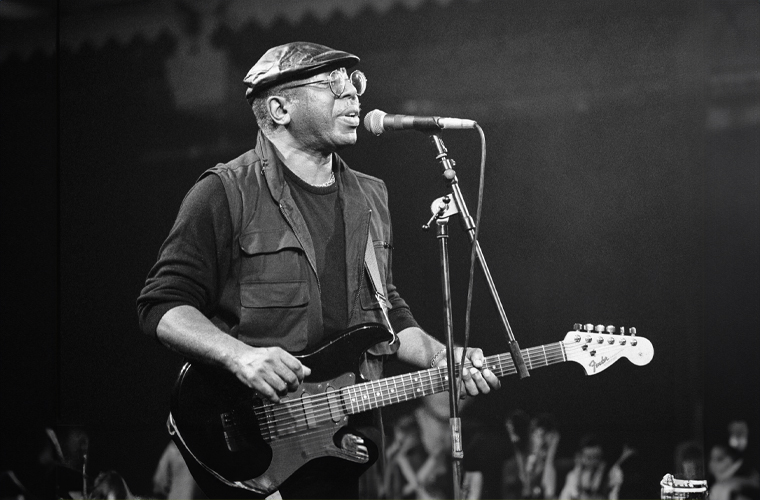Curtis Mayfield was a towering figure in American music, a singer, songwriter, and producer whose velvet-smooth tenor and incisive lyrics blended soul, funk, and gospel into anthems of social change. Often hailed as one of the most influential artists of the 20th century, Mayfield’s work transcended genres, inspiring generations with messages of empowerment, civil rights, and resilience. From the harmonious group sounds of the 1960s to the gritty funk of the 1970s, his music captured the pulse of Black America during turbulent times, earning him a place in the Rock and Roll Hall of Fame and a lasting legacy as the “Gentle Genius.”
Born on June 3, 1942, in Chicago’s Cabrini-Green housing projects, Mayfield grew up in a world shaped by the Great Migration, economic hardship, and the stirrings of the civil rights movement. The son of a single mother, Lavern, and raised alongside his four siblings, he found solace and purpose in the church. By age six, he was singing in the Antioch Baptist Church choir, where his prodigious talent—marked by a crystalline voice and innate songwriting gift—quickly emerged. Influenced by gospel greats like Mahalia Jackson and secular hits from Nat King Cole, young Curtis taught himself guitar and began performing on street corners.
At 14, Mayfield dropped out of Englewood High School to pursue music full-time, a decision that paid off almost immediately. In 1956, he met 17-year-old Jerry Butler, and together they formed a doo-wop group initially called the Roosters. Renamed The Impressions after a 1958 single, the group signed with Vee-Jay Records, launching Mayfield’s career. Chicago’s vibrant R&B scene, fueled by labels like Chess and Vee-Jay, became his proving ground, where he honed a style that fused heartfelt harmonies with subtle social commentary.




















The Impressions’ breakthrough came in 1958 with “For Your Precious Love,” a Butler-led ballad co-written by Mayfield that topped the R&B charts and cracked the pop Top 30. Though Butler soon left for a solo career, Mayfield stepped up as lead vocalist and chief songwriter, recruiting Fred Cash and Sam Gooden to solidify the trio. Under Mayfield’s guidance, The Impressions became architects of “Chicago soul,” a polished yet urgent sound that contrasted the rawer Memphis and Detroit styles.
Their 1960s output was a masterclass in uplift and activism. Hits like “It’s All Right” (1963) and “Amen” (1964) showcased Mayfield’s optimistic falsetto over swaying rhythms, but it was his protest songs that cemented his revolutionary ethos. “Keep On Pushing” (1964), inspired by the Freedom Rides, became a civil rights staple, while “People Get Ready” (1965)—a gospel-tinged plea for unity featuring Mayfield’s iconic line, “There’s a train a-comin'”—earned a Grammy Hall of Fame induction and covers by everyone from Bob Dylan to Jeff Beck. By the decade’s end, The Impressions had racked up 14 Top 40 hits, but Mayfield’s vision outgrew the group. He left in 1970, leaving behind a blueprint for socially conscious soul.
Mayfield’s solo debut, Curtis (1970), was a bold pivot to funky, psychedelic soul, produced at the legendary RCA Studios in Chicago. Tracks like the euphoric “Move On Up”—with its triumphant horns, wah-wah guitar, and mantra-like chorus—became an international anthem of perseverance, later sampled by everyone from Kanye West to Biggie Smalls. The album’s raw honesty about urban struggle set the tone for his ’70s output.
His crowning achievement came with the soundtrack for Super Fly (1972), Gordon Parks Jr.’s blaxploitation film about a cocaine dealer grappling with the American Dream. Mayfield initially hesitated, wary of glorifying drugs, but he transformed the project into a critique of systemic poverty and racial injustice. The title track’s funky bassline and defiant lyrics (“I’m your mama, I’m your daddy”) dominated charts, while “Freddie’s Dead” painted a haunting portrait of inner-city despair. The Super Fly soundtrack topped the Billboard 200 for four weeks, sold over a million copies, and won Mayfield his only Grammy (for Best Instrumental Performance). It remains one of the best-selling soundtracks ever, influencing hip-hop’s golden age.
Mayfield’s ’70s catalog—albums like Back to the World (1973), with its Vietnam War protest “Future Shock,” and There’s No Place Like America Today (1975)—continued his role as a musical conscience. He scored films like Claudine (1974), earning an Oscar nomination for “On and On,” and collaborated with Aretha Franklin and others. His sound evolved with the times: extended jams, conga-driven grooves, and a guitar style that anticipated Prince and Jimi Hendrix.
Tragedy struck in 1990 during an outdoor concert in Brooklyn, when a lighting rig fell, paralyzing Mayfield from the neck down. Confined to a wheelchair, he battled health issues exacerbated by type 2 diabetes, yet refused to fade. From his Atlanta home, he recorded New World Order (1996), a defiant album featuring guest spots from Branford Marsalis and even a hologram-like appearance at the 1995 Rock and Roll Hall of Fame induction (where The Impressions were honored).
Mayfield passed away on December 26, 1999, at age 57 in Roswell, Georgia, from complications of his illnesses. He was posthumously awarded the Grammy Lifetime Achievement Award in 1995 and inducted into the Songwriters Hall of Fame in 1990.
Today, Mayfield’s influence echoes everywhere: in hip-hop samples (A Tribe Called Quest’s “Electric Relaxation” nods to him), modern soul revivalists like Leon Bridges, and global anthems against inequality. His music wasn’t just heard—it was felt, a call to “move on up” toward justice. As he sang, “Don’t worry ’bout a thing”—a reminder that in the face of adversity, the human spirit, like his songs, endures.

